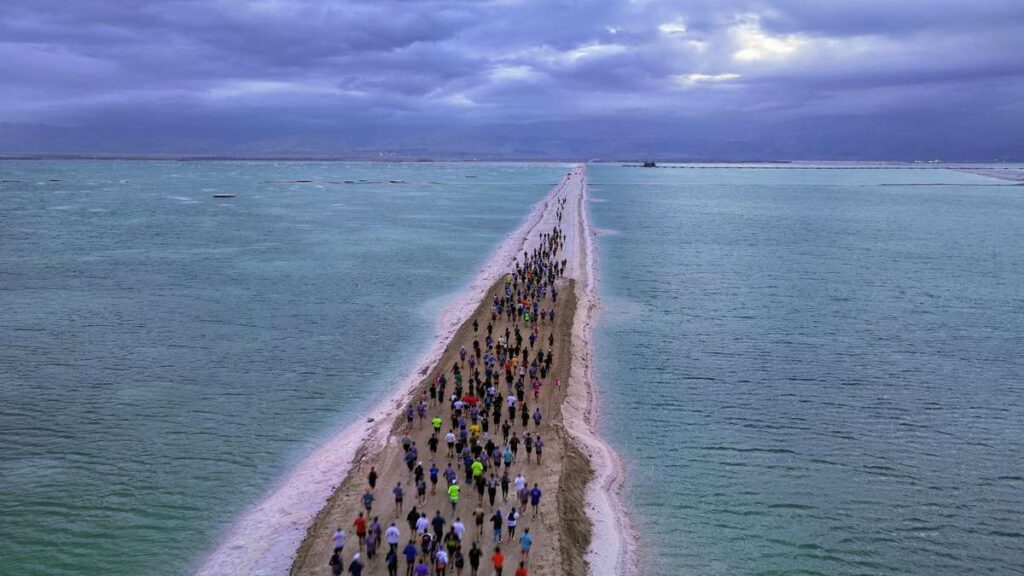Experience the Unifying Spirit of the Dead Sea Marathon
The Dead Sea Marathon, set against the stunning backdrop of the world’s lowest point at 430 meters below sea level, offers a unique experience unlike traditional city marathons. Unlike the bustling streets of major cities such as New York or London, this race takes participants along the serene gravel dikes that border the Dead Sea, providing a rare opportunity for runners to connect with nature in a truly spectacular landscape. The marathon, once known as the Ein Gedi race, has been an enduring event since its inception in 1981, driven by the vision of Eli Ron from Kibbutz Ein Gedi.
A Community United in Adversity
This year’s Dead Sea Marathon, which attracted nearly 8,000 participants—mostly from Israel’s diverse communities of Jewish and Muslim runners—felt particularly poignant. Following the tragic events that occurred on October 7, the atmosphere at the marathon reflected a collective sense of mourning yet also of hope and unity. Rather than a mere race to the finish line, this event transformed into a powerful symbol representing shared grief and resilience.
Honoring Lives and Strengthening Bonds
Throughout the marathon, hundreds of participants donned shirts featuring the faces of hostages alongside Israeli flags, thus merging the acts of remembrance and solidarity. The once-contentious display of flags now served as a powerful reminder of the strength of community and collective identity. Runner discussions revealed that the pain of loss and the impact of the ongoing conflict resonated deeply, reinforcing the sense of connection among participants, all of whom were personally affected in some way by the recent turmoil.
Resilience Amidst Emotion
The pre-race vibe was a mix of somberness and energetic celebration, featuring lively EDM music that contrasted sharply with the emotional weight of the day. This blend of joy and acute awareness of the extensive challenges facing the country fostered a unique uplifting environment, illustrating how community spirit can flourish even in dark times. Snacks—ranging from pretzels to fresh fruit—offered not just nourishment but also the embodiment of Israel’s renowned hospitality, fostering camaraderie amongst a diverse participant base.
Diversity and Unity on Display
Despite a reduction in international participants due to the current geopolitical climate, the marathon showcased a rich tapestry of Israeli society. Over 200 foreigners mingled with locals, comprising families, young Orthodox individuals, and new immigrants, all coming together in a testament to unity. This outpouring of support highlighted that despite ongoing conflicts, residents and visitors alike could share meaningful experiences that transcend differences.
A Landmark of Shared Strength and Identity
As race director Ophir Kindler optimistically expressed, the Dead Sea Marathon emphasizes a desire for increased participation by international runners in future years. This wish speaks to a broader understanding of Israel as a sanctuary for communal experiences, even amidst challenges. Notably, many runners voiced feelings of safety during their visit, some even feeling more secure in Israel than in their home nations—a sentiment shared by numerous attendees.
A Lasting Legacy of the Dead Sea Marathon
The story of the Dead Sea Marathon extends far beyond its competitive elements; it embodies a deep cultural tradition rooted in family and remembrance. Eli Ron, whose sons Giora and Tomer have become symbols of the race’s history, serves as a poignant reminder of the personal losses that made this event significant. Each year he opens the race, underscoring the ongoing journey of remembrance and unity, making the experience resonate deeply with all participants.
The Dead Sea Marathon delivers not just a typical running experience but a lasting testament to the spirit of resilience, community pride, and the inherent strength found in shared challenges. For many, while this marathon represents a once-in-a-lifetime opportunity to run at the lowest point on earth, it also serves as a powerful reminder that Israel continues to stand firm and united in the face of adversity.
